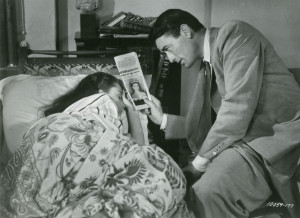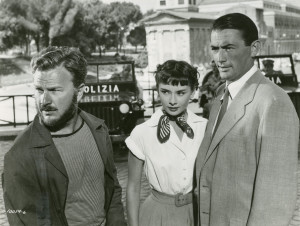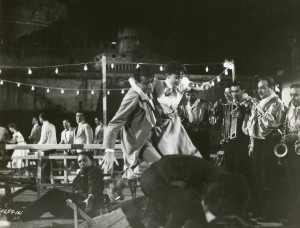by Barb Lentz.
The five movies Bob provided me from which to choose were these:
Deliverance (1972)
Freaks (1932)
The Jazz Singer (1927)
Mighty Joe Young (1949)
Roman Holiday (1953)
I was close to choosing Deliverance because it’s one of those titles that has a great reputation and I would enjoy seeing Burt Reynolds in a good dramatic role. But Roman Holiday was playing in special shows at our local AMC theater (where Bob managed for a time), so we went to see that on the big screen. We were not disappointed.
Roman Holiday is the story of a visit to Rome by a young princess (Audrey Hepburn) who has already grown tired of the strict formalities and boring social functions required by her position. She just wants to cut free and live a little, and one night, she does, escaping from her embassy to walk the streets of Rome. Sleeping medicine makes her seem drunk, and she is taken in by an American journalist (Gregory Peck), who eventually discovers who she is, but determines not to tell her in order to get a story. The following day they tour the city, allowing the shy princess to get a taste of how people really live, and a romance blooms. But the princess realizes that she has duties that will not allow her the freedom she so desires, and she reluctantly bids farewell to the journalist — and her dreams of normalcy — at the end of the day. The story concludes at a press conference where the journalist and his photographer friend (Eddie Albert) reveal to her who they really are — yet they keep her clandestine escapade secret.

There is much to admire in this movie, a genuine gem from the 1950s. While dialogue is plentiful, most of the feelings the characters convey are communicated non-verbally, through looks or gestures or, best of all, restraint. This film could be played without sound, like the silent films of the past, and most of its meanings would be crystal clear. This is especially true at the film’s coda, where the princess is trepidatious upon learning that the man with whom she has been wandering through Rome is a journalist, and he can only express through his face that he will never betray her.
I also really appreciate its bittersweet tone. It is a generally comedic tale, yet running throughout, established from the beginning, is the knowledge that eventually this escapade must end. The princess will have to return to her position; there is no escape for her, mostly because she would never allow herself to shirk her national duties for more than just the one day. Any romance she begins with genial Joe Bradley or anyone else must by necessity remain subservient to her country’s national interest. That fact enhances the personal meaning and beauty of the moments she can steal away from her professional life — and we can believe that the photos of her special day in Rome that Irving slips to her will be cherished for as long as she lives.
Also, we’ve never been to Rome, or anywhere else in Italy, so seeing the Colosseum, the Trevi Fountain and all the other sights is akin to watching a travelogue. It isn’t the same as being there, of course, yet seeing characters visit and appreciate the places you would like to visit and appreciate is rewarding in its own way.

My top five aspects of the movie are:
1. Audrey Hepburn. In her first major role she is enchanting; it is no wonder that she won the Oscar and instantly became an inter-national film star. Her innocence is completely convincing, and when she stands up to her “handlers” at the embassy, she steels her voice and warns them in no uncertain terms that she knows her duty better than they ever will — that is a magnificent moment. Her voice quavers a little bit, indicating that she is still trying to subdue her emotions, and if they are let loose she will not be responsible for her actions. It is that moment when Princess Ann truly accepts her fate.
2. Joe Bradley’s integrity. Finding a seemingly intoxicated woman late at night, the journalist does the responsible thing. Lots of other men would have provided the princess with a rude awakening. And then at the end, he forsakes his job (and the money he has borrowed from Irving) to keep the princesses reputation safe and secure. It was sad that they couldn’t be together, but it was also nice to know that he was worthy of her affection.
3. That small moments are so important to the story. When the princess temporarily loses her shoe, it could have blossomed into an international embarrassment, but Ann retrieves it safely and the scandal is averted. Ann changes her hair style and slips into sandals and no one recognizes her. Riding a scooter recklessly almost ends their adventure together, but charm and lies to the police carry the day. A bridge overloaded with sentiments brings Ann to tears. Ice cream seems like a miracle on a hot day. For everyone else this is just another day, but for Ann it is a once-in-a-lifetime adventure.

4. The Mouth of Truth scene. Joe, Ann and Irving stop at a church with an old marble face where the local legend dares people to reach in to the sculpture’s dark mouth; the legend is that if one tells a lie one’s hand will be bitten off. Joe dares Ann to test it but she is too anxious. Joe takes the chance himself, and suddenly screams. Ann’s reaction is priceless, mainly because Audrey Hepburn was not expecting her costar to pull a prank on her with the cameras rolling. It’s such a wonderful moment because it is spontaneously hilarious — just the sort of thing that Bob would do under the same circumstances.
5. The ending. While the story could have ended with the princess leaving Joe and retreating back to the embassy, it allowed Joe and Irving to see Ann one last time at a press conference, where their unspoken feelings for each other are beautifully communicated. The capper is when the princess is asked by a reporter which European city she has most enjoyed on her tour. She begins to give a neutral answer, but then amends it, looking toward Joe and saying, “Rome, by all means Rome! I will cherish my visit here in memory for as long as I live.” What a great romantic moment.
Is Roman Holiday a classic? Absolutely! William Wyler’s travelogue of Rome is light, romantic, charming and funny, even with its dark subtext of class differences. It is impossible, of course, for them to have so many adventures in just one day, and one would think that a princess would be a bit more worldly, yet the film transcends its logic limitations to present a wish-fulfillment that anyone other than a royal would be happy to experience. I believe this to be a very well-made film, and it is certainly most enjoyable. I feel that this is my favorite so far of the potential classics Bob and I have seen together.
BRL 7 January 2016.
Roman Holiday (September 2, 1953) Paramount Pictures.
Produced and Directed by William Wyler.
Story and Screenplay by Dalton Trumbo.
Principal Cast (character, performer):
Joe Bradley Gregory Peck
Princess Ann Audrey Hepburn
Irving Radovich Eddie Albert
Mr. Hennessy Hartley Power
Ambassador Harcourt Williams
Countess Vereberg Margaret Rawlins
118 minutes. Black and White. Not Rated.
